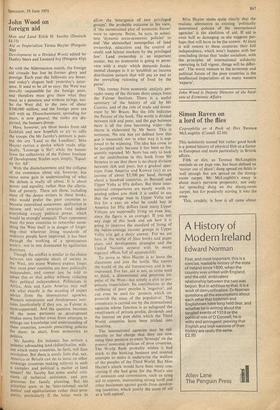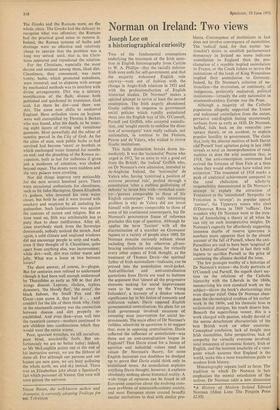Simon Raven on a lord of the flies
This tastelessly named but rather good book is a potted history of physical filth as a factor in European and more particularly in British affairs.
Filth or dirt, as Terence McLaughlin reminds us on page one, has been defined as 'matter out of place'; dung spread on fields is well enough but not spread on the dining- room carpet. Mr McLaughlin's essay is about man's perverse propensity, not only for spreading dung on the dining-room carpet, but for positively stirring it into the soup.
This, crudely, is how it all came about. The Greeks and the Romans were, on the whole, clean. The Greeks had the delicacy to recognise what was offensive; the Romans had the practical good sense to remove it. Indeed, the Roman systems of baths and drainage were so effective and relatively cheap to operate that the problem was a long way solved: until, that is, the Chris- tians appeared and repudiated the solution.
For the Christians, especially the most devout and eminent among them, liked dirt. Cleanliness, they announced, was mere vanity; baths, which promoted nakedness, were immoral; and to dispense with sewage by mechanical methods was to interfere with divine arrangements. Dirt was a salutary mortification of the flesh; disease both published and quickened its transience. God said, Let there be dirt—and there was dirt. The scene now shifts to mediaeval England. Here orthodox views on hygiene were well exemplified by Thomas a. Becket, who was found, after his death, to be wear- ing eight layers of rotting and verminous garments. Most powerfully did the odour of sanctity prevail in the City of God. As for the cities of man, such public baths as had survived had become 'stews' or brothels in which unchanged water festered for months on end; and the plumbing of the Roman oc- cupation, built to last for millennia if given just a modicum of attention, was choked beyond repair. The streets were middens and the very palaces were crawling.
Nor did things improve very noticeably for the next several hundred years. There were occasional enthusiasts for cleanliness, such as Sir John Harington, Queen Elizabeth I's godson, who invented his own water closet; but both he and it were treated with mockery and suspicion by all including his godmother. Such fastidiousness was against the customs of nature and religion. But as time went on, filth was attributable less to piety than to sheer indifference. After all, since everybody stank from the Sovereign downwards, nobody noticed the stench. And again, a cold climate and unglazed windows did not encourage people to strip and wash, even if they thought of it. Cleanliness, quite apart from anything else, was inconvenient; while dirt—well, dirt was rather warm and jolly. What was a louse or two between lover's?
The short answer, of course, is—plague. But for centuries men refused to understand (though it had been well enough understood by Thucydides as early as 500 ac that dirt brings disease. Leprosy, cholera, typhus, dysentery, 'the bloody flux', 'the sweat', the black buboes, the Small Pox and the Great—you name it, they had it . . . and couldn't for the life of them think why. Only in the nineteenth century was the connection between disease and dirt properly re- established. And even then—even well into the twentieth century—mothers continued to sew children into combinations which they would wear the entire winter.
Poor, ignorant wretches, we tell ourselves; poor blind, unscientific fools. But un- fortunately we are no better today; indeed, as Mr McLaughlin points out at the end of his instructive survey, we are the filthiest of them all. For although our persons and our houses are now pure, we are busy polluting the whole earth, sea and sky instead. There was an Elizabethan joke about a Spaniard's fart which poisoned all Venice. Our own will soon poison the universe.
Simon Raven, the well-known author and dramatist, is currently adapting Trollope for BBC Television



































 Previous page
Previous page